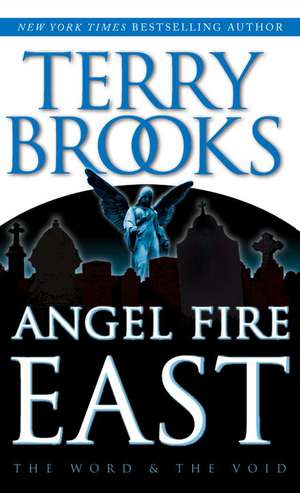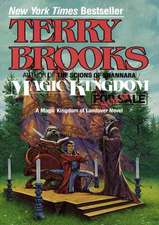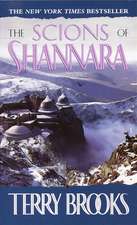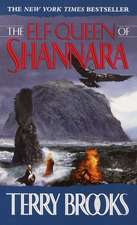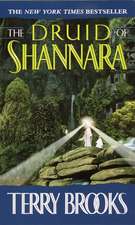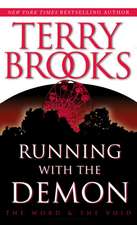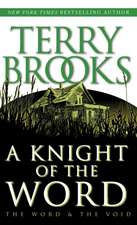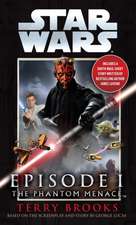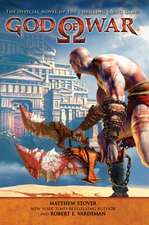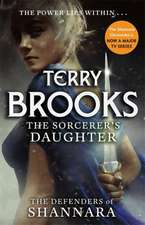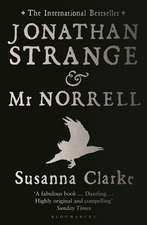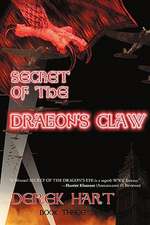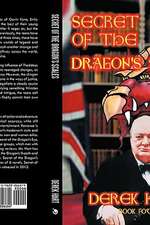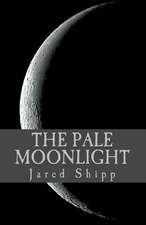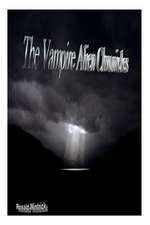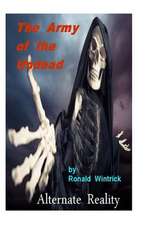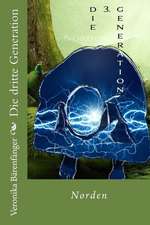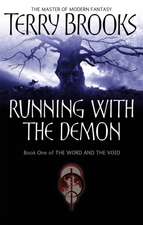Angel Fire East
Autor Terry Brooksen Limba Engleză Paperback – 31 aug 2000
The birth of a gypsy morph, a rare and dangerous creature that could be an invaluable weapon in his fight against the Void, brings John Ross and Nest Freemark together again. Twice before, with the fate of the world hanging in the balance, the lives of Ross and Nest have intersected. Together, they have prevailed. But now they will face an ancient evil beyond anything they have ever encountered, a demon of ruthless intelligence and feral cunning. As a firestorm of evil erupts, threatening to consume lives and shatter dreams, they have but a single chance to solve the mystery of the Gypsy morph--and their own profound connection.
| Toate formatele și edițiile | Preț | Express |
|---|---|---|
| Paperback (2) | 54.27 lei 3-5 săpt. | +28.38 lei 4-10 zile |
| Little Brown Book Group – 3 aug 2006 | 54.27 lei 3-5 săpt. | +28.38 lei 4-10 zile |
| Del Rey Books – 31 aug 2000 | 59.01 lei 3-5 săpt. |
Preț: 59.01 lei
Nou
Puncte Express: 89
Preț estimativ în valută:
11.29€ • 12.26$ • 9.49£
11.29€ • 12.26$ • 9.49£
Carte disponibilă
Livrare economică 01-15 aprilie
Preluare comenzi: 021 569.72.76
Specificații
ISBN-13: 9780345435255
ISBN-10: 0345435257
Pagini: 384
Dimensiuni: 107 x 174 x 27 mm
Greutate: 0.19 kg
Editura: Del Rey Books
ISBN-10: 0345435257
Pagini: 384
Dimensiuni: 107 x 174 x 27 mm
Greutate: 0.19 kg
Editura: Del Rey Books
Notă biografică
A writer since high school, Terry Brooks published his first novel, The Sword of Shannara, in 1977. It was a New York Times bestseller for more than five months. He has published fifteen consecutive bestsellers since, including the novel based upon the screenplay and story by George Lucas: Star Wars®: Episode I The Phantom Menace™. His novels Running with the Demon and A Knight of the Word both won the "Rocky Award" given by The Rocky Mountain News.
The author was a practicing attorney for many years but now writes full-time. He lives with his wife, Judine, in the Pacific Northwest and Hawaii.
The author was a practicing attorney for many years but now writes full-time. He lives with his wife, Judine, in the Pacific Northwest and Hawaii.
Extras
He stands at the edge of a barren and ravaged orchard looking up from the base of a gentle rise to where the man hangs from a wooden cross. Iron spikes have been hammered through the man's hands and feet, and his wrists and ankles have been lashed tightly in place so he will not tear free. Slash wounds crisscross his broken body, and he bleeds from a deep puncture in his side. His head droops in the shadow of his long, lank hair, and the rise and fall of his chest as he breathes is shallow and weak.
Behind him, serving as a poignant backdrop to the travesty of his dying, stands the fire-blackened shell of a tiny, burned-out country church. The cross from which the man hangs has been stripped from the sanctuary, torn free from the metal brackets that secured it to the wall behind the altar, and set into the earth. Patches of polished oak glisten faintly in the gray daylight, attesting to the importance it was once accorded in the worshipping of God.
Somewhere in the distance, back where the little town that once supported this church lies, screams rise up against the unmistakable sounds of butchery.
John Ross stands motionless for the longest time, pondering the implications of the horrific scene before him. There is nothing he can do for the man on the cross. He is not a doctor; he does not possess medical skills. His magic can heal and sustain only himself and no other. He is a Knight of the Word, but he is a failure, too. He lives out his days alone in a future he could not prevent. What he looks upon is not unusual in the postapocalyptic horror of civilization's demise, but is sadly familiar and disturbingly mundane.
He can take the man down, he decides finally, even if he cannot save him. By his presence, Ross can give the man a small measure of peace and comfort.
Beneath a wintry sky that belies the summer season, he strides up the rise to the man on the cross. The man does not lift his head or stir in any way that would indicate he knows Ross is present. Beneath a sheen of sweat and blood, his lean, muscular body is marked with old wounds and scars. He has endured hardships and abuse somewhere in his past, and it seems unfair that he should end his days in still more pain and desolation.
Ross slows as he nears, his eyes drifting across the blackened facade of the church and the trees surrounding it. Eyes glimmer in the shadows, revealing the presence of feeders. They hover at the fringes of his vision and in the concealment of sunless corners, waiting to assuage their hunger. They do not wait for Ross. They wait for the man on the cross. They wait for him to die, so they can taste his passing from life into death--the most exquisite, fulfilling, and rare of the human emotions they crave.
Ross stares at them until the light dims in their lantern eyes and they slip back into darkness to bide their time.
A shattered length of wood catches the Knight's attention, and his eyes shift to the foot of the cross. The remains of a polished black staff lie before him--a staff like the one he carries in his hands. A shock goes through him. He stares closely, unable to believe what he has discovered. There must be a mistake, he thinks. There must be another explanation.
But there is neither. Like himself, the man on the cross is a Knight of the Word.
He moves quickly now, striding forward to help, to lower the cross, to remove the spikes, to free the man who hangs helplessly before him.
But the man senses him now and in a ragged, whispery voice says, Don't touch me.
Ross stops instantly, the force of the other's words and the surprise of his consciousness bringing him to a halt.
They have poisoned me, the other says.
Ross draws a long, slow breath and exhales in weary recognition: Those who have crucified this Knight of the Word have coated him in a poison conjured of demon magic. He is without hope.
Ross steps back, looking up at the Knight on the cross, at the slow, shallow rise and fall of his breast, at the rivulets of blood leaking from his wounds, at the shadow of his face, still concealed within the curtain of his long hair.
They caught me when I did not have my magic to protect me, the stricken Knight says softly. I had expended it all on an effort to escape them earlier. I could not replenish it quickly enough. Sensing I was weak, they gave chase. They hunted me down. Demons and once-men, a small army hunting pockets of resistance beyond the protection of the city fortresses. They found me hiding in the town below. They dragged me here and hung me on this cross to die. Now they kill all those who tried to help me.
Ross finds his attention drawn once more to the shrieks that come from the town. They are beginning to fade, to drain away into a deep, ominous silence.
I have not done well in my efforts to save mankind, the Knight whispers. He gasps and chokes on the dryness in his throat. Blood bubbles to his lips and runs down his chin to his chest.
Nor have any of us, Ross says.
There were chances. There were times when we might have made a difference.
Ross sighs. We did with them what we could.
A bird's soft warble wafts through the trees. Black smoke curls skyward from the direction of the town, rife with the scent of human carnage.
Perhaps you were sent to me.
Ross turns from the smoke to look again at the man on the cross, not understanding.
Perhaps the Word sent you to me. A final chance at redemption.
No one sent me, Ross thinks, but does not speak the words.
You will wake in the present and go on. I will die here. You will have a chance to make a difference still. I will not.
No one sent me, Ross says quickly now, suddenly uneasy.
But the other is not listening. In late fall, three days after Thanksgiving, once long ago, when I was on the Oregon coast, I captured a gypsy morph.
His words wheeze from his mouth, coated in the sounds of his dying. But as he speaks, his voice seems to gain intensity.
It is my greatest regret, that I found it, so rare, so precious, made it my own, and could not solve the mystery of its magic. The chance of a lifetime, and I let it slip away.
The man on the cross goes silent then, gasping slowly for breath, fighting to stay alive just a few moments longer, broken and shattered within and without, left in his final moments to contemplate the failures he perceives are his. Eyes reappear in the shadows of the burned-out church and blighted orchard, the feeders beginning to gather in anticipation. Ross can scorch the earth with their gnarled bodies, can strew their cunning eyes like leaves in the wind, but it will all be pointless. The feeders are a part of life, of the natural order of things, and you might as well decide there is no place for humans either, for it is the humans who draw the feeders and sustain them.
The Knight of the Word who hangs from the cross is speaking again, telling him of the gypsy morph, of how and when and where it will be found, of the chance Ross might have of finding it again. He is giving Ross the details, preparing him for the hunt, thinking to give another the precious opportunity that he has lost. But he is giving Ross the chance to fail as well, and it is on that alone his listener settles in black contemplation.
Do this for me if you can, the man whispers, his voice beginning to fail him completely, drying up with the draining away of his life, turning parched and sandy in his throat. Do it for yourself.
Ross feels the implications of the stricken Knight's charge razor through him. If he undertakes so grave and important a mission, if he embraces so difficult a cause, it may be his own undoing.
Yet, how can he do otherwise?
Promise me.
The words are thin and weak and empty of life. Ross stares in silence at the man.
Promise me ...
John Ross awoke with sunshine streaming down on his face and the sound of children's voices ringing in his ears. The air was hot and sticky, and the smell of fresh turned earth and new leaves rose on a sudden breeze. He blinked and sat up. He was hitch-hiking west through Pennsylvania, and he had stopped at a park outside Allentown to rest, then fallen asleep beneath the canopy of an old hardwood. He had thought only to doze for a few minutes, but he hadn't slept well in days, and the lack of sleep had finally caught up to him.
He gazed around slowly to regain his bearings. The park was large and thickly wooded, and he had chosen a spot well back from the roads and playgrounds to rest. He was alone. He looked down at his backpack and duffel bag, then at the polished black staff in his hands. His throat was dry and his head ached. A spot deep in his chest burned with the fury of hot coals.
His dream shimmered in a haze of sunlight just before his eyes, images from a private hell.
He was a Knight of the Word, living one life in the present and another in the future, one while awake and another while asleep, one in which he was given a chance to change the world and another in which he must live forever with the consequences of his failure to do so. He had accepted the charge almost twenty-five years ago and had lived with it ever since. He had spent almost the whole of his adult life engaged in a war that had begun with the inception of life and would not end until its demise. There were no boundaries to the battlefield on which he fought--neither of space nor of time. There could be no final resolution.
But the magic of a gypsy morph could provide leverage of a sort that could change everything.
He reached in his backpack and brought forth a battered water bottle. Removing the cap, he drank deeply from its lukewarm contents, finding momentary relief for the dryness in his throat and mouth. He had trouble fitting the cap in place again. The dream had shaken him. His dreams did so often, for they were of a world in which madness ruled and horror was commonplace. There was hope in the present of his waking, but none in the future of his sleep.
Still, this dream was different.
He climbed to his feet, strapped the backpack in place, picked up the duffel bag, and walked back through the park toward the two-lane blacktop that wound west toward Pittsburgh. As always, the events of his dream would occur soon in his present, giving him a chance to affect them in a positive way. It was June. The gypsy morph would be born three days after Thanksgiving. If he was present and if he was quick enough, he would be able to capture it.
Then he would have roughly thirty days to change the course of history.
That challenge would have shaken any man, but it was not the challenge of the gypsy morph that haunted Ross as he walked from the park to begin his journey west. It was his memory of the man on the cross in his dream, the fallen Knight of the Word. It was the man's face as it had lifted from the shadow of his long hair in the final moments of his life.
For the face of the man hanging on the cross had been his own.
From the Hardcover edition.
Behind him, serving as a poignant backdrop to the travesty of his dying, stands the fire-blackened shell of a tiny, burned-out country church. The cross from which the man hangs has been stripped from the sanctuary, torn free from the metal brackets that secured it to the wall behind the altar, and set into the earth. Patches of polished oak glisten faintly in the gray daylight, attesting to the importance it was once accorded in the worshipping of God.
Somewhere in the distance, back where the little town that once supported this church lies, screams rise up against the unmistakable sounds of butchery.
John Ross stands motionless for the longest time, pondering the implications of the horrific scene before him. There is nothing he can do for the man on the cross. He is not a doctor; he does not possess medical skills. His magic can heal and sustain only himself and no other. He is a Knight of the Word, but he is a failure, too. He lives out his days alone in a future he could not prevent. What he looks upon is not unusual in the postapocalyptic horror of civilization's demise, but is sadly familiar and disturbingly mundane.
He can take the man down, he decides finally, even if he cannot save him. By his presence, Ross can give the man a small measure of peace and comfort.
Beneath a wintry sky that belies the summer season, he strides up the rise to the man on the cross. The man does not lift his head or stir in any way that would indicate he knows Ross is present. Beneath a sheen of sweat and blood, his lean, muscular body is marked with old wounds and scars. He has endured hardships and abuse somewhere in his past, and it seems unfair that he should end his days in still more pain and desolation.
Ross slows as he nears, his eyes drifting across the blackened facade of the church and the trees surrounding it. Eyes glimmer in the shadows, revealing the presence of feeders. They hover at the fringes of his vision and in the concealment of sunless corners, waiting to assuage their hunger. They do not wait for Ross. They wait for the man on the cross. They wait for him to die, so they can taste his passing from life into death--the most exquisite, fulfilling, and rare of the human emotions they crave.
Ross stares at them until the light dims in their lantern eyes and they slip back into darkness to bide their time.
A shattered length of wood catches the Knight's attention, and his eyes shift to the foot of the cross. The remains of a polished black staff lie before him--a staff like the one he carries in his hands. A shock goes through him. He stares closely, unable to believe what he has discovered. There must be a mistake, he thinks. There must be another explanation.
But there is neither. Like himself, the man on the cross is a Knight of the Word.
He moves quickly now, striding forward to help, to lower the cross, to remove the spikes, to free the man who hangs helplessly before him.
But the man senses him now and in a ragged, whispery voice says, Don't touch me.
Ross stops instantly, the force of the other's words and the surprise of his consciousness bringing him to a halt.
They have poisoned me, the other says.
Ross draws a long, slow breath and exhales in weary recognition: Those who have crucified this Knight of the Word have coated him in a poison conjured of demon magic. He is without hope.
Ross steps back, looking up at the Knight on the cross, at the slow, shallow rise and fall of his breast, at the rivulets of blood leaking from his wounds, at the shadow of his face, still concealed within the curtain of his long hair.
They caught me when I did not have my magic to protect me, the stricken Knight says softly. I had expended it all on an effort to escape them earlier. I could not replenish it quickly enough. Sensing I was weak, they gave chase. They hunted me down. Demons and once-men, a small army hunting pockets of resistance beyond the protection of the city fortresses. They found me hiding in the town below. They dragged me here and hung me on this cross to die. Now they kill all those who tried to help me.
Ross finds his attention drawn once more to the shrieks that come from the town. They are beginning to fade, to drain away into a deep, ominous silence.
I have not done well in my efforts to save mankind, the Knight whispers. He gasps and chokes on the dryness in his throat. Blood bubbles to his lips and runs down his chin to his chest.
Nor have any of us, Ross says.
There were chances. There were times when we might have made a difference.
Ross sighs. We did with them what we could.
A bird's soft warble wafts through the trees. Black smoke curls skyward from the direction of the town, rife with the scent of human carnage.
Perhaps you were sent to me.
Ross turns from the smoke to look again at the man on the cross, not understanding.
Perhaps the Word sent you to me. A final chance at redemption.
No one sent me, Ross thinks, but does not speak the words.
You will wake in the present and go on. I will die here. You will have a chance to make a difference still. I will not.
No one sent me, Ross says quickly now, suddenly uneasy.
But the other is not listening. In late fall, three days after Thanksgiving, once long ago, when I was on the Oregon coast, I captured a gypsy morph.
His words wheeze from his mouth, coated in the sounds of his dying. But as he speaks, his voice seems to gain intensity.
It is my greatest regret, that I found it, so rare, so precious, made it my own, and could not solve the mystery of its magic. The chance of a lifetime, and I let it slip away.
The man on the cross goes silent then, gasping slowly for breath, fighting to stay alive just a few moments longer, broken and shattered within and without, left in his final moments to contemplate the failures he perceives are his. Eyes reappear in the shadows of the burned-out church and blighted orchard, the feeders beginning to gather in anticipation. Ross can scorch the earth with their gnarled bodies, can strew their cunning eyes like leaves in the wind, but it will all be pointless. The feeders are a part of life, of the natural order of things, and you might as well decide there is no place for humans either, for it is the humans who draw the feeders and sustain them.
The Knight of the Word who hangs from the cross is speaking again, telling him of the gypsy morph, of how and when and where it will be found, of the chance Ross might have of finding it again. He is giving Ross the details, preparing him for the hunt, thinking to give another the precious opportunity that he has lost. But he is giving Ross the chance to fail as well, and it is on that alone his listener settles in black contemplation.
Do this for me if you can, the man whispers, his voice beginning to fail him completely, drying up with the draining away of his life, turning parched and sandy in his throat. Do it for yourself.
Ross feels the implications of the stricken Knight's charge razor through him. If he undertakes so grave and important a mission, if he embraces so difficult a cause, it may be his own undoing.
Yet, how can he do otherwise?
Promise me.
The words are thin and weak and empty of life. Ross stares in silence at the man.
Promise me ...
John Ross awoke with sunshine streaming down on his face and the sound of children's voices ringing in his ears. The air was hot and sticky, and the smell of fresh turned earth and new leaves rose on a sudden breeze. He blinked and sat up. He was hitch-hiking west through Pennsylvania, and he had stopped at a park outside Allentown to rest, then fallen asleep beneath the canopy of an old hardwood. He had thought only to doze for a few minutes, but he hadn't slept well in days, and the lack of sleep had finally caught up to him.
He gazed around slowly to regain his bearings. The park was large and thickly wooded, and he had chosen a spot well back from the roads and playgrounds to rest. He was alone. He looked down at his backpack and duffel bag, then at the polished black staff in his hands. His throat was dry and his head ached. A spot deep in his chest burned with the fury of hot coals.
His dream shimmered in a haze of sunlight just before his eyes, images from a private hell.
He was a Knight of the Word, living one life in the present and another in the future, one while awake and another while asleep, one in which he was given a chance to change the world and another in which he must live forever with the consequences of his failure to do so. He had accepted the charge almost twenty-five years ago and had lived with it ever since. He had spent almost the whole of his adult life engaged in a war that had begun with the inception of life and would not end until its demise. There were no boundaries to the battlefield on which he fought--neither of space nor of time. There could be no final resolution.
But the magic of a gypsy morph could provide leverage of a sort that could change everything.
He reached in his backpack and brought forth a battered water bottle. Removing the cap, he drank deeply from its lukewarm contents, finding momentary relief for the dryness in his throat and mouth. He had trouble fitting the cap in place again. The dream had shaken him. His dreams did so often, for they were of a world in which madness ruled and horror was commonplace. There was hope in the present of his waking, but none in the future of his sleep.
Still, this dream was different.
He climbed to his feet, strapped the backpack in place, picked up the duffel bag, and walked back through the park toward the two-lane blacktop that wound west toward Pittsburgh. As always, the events of his dream would occur soon in his present, giving him a chance to affect them in a positive way. It was June. The gypsy morph would be born three days after Thanksgiving. If he was present and if he was quick enough, he would be able to capture it.
Then he would have roughly thirty days to change the course of history.
That challenge would have shaken any man, but it was not the challenge of the gypsy morph that haunted Ross as he walked from the park to begin his journey west. It was his memory of the man on the cross in his dream, the fallen Knight of the Word. It was the man's face as it had lifted from the shadow of his long hair in the final moments of his life.
For the face of the man hanging on the cross had been his own.
From the Hardcover edition.
Recenzii
"That is Brooks' way of casting spells--transporting his readers into plausible realms where sorcery is alive, whether those places are in other ages or right in the middle of our own. As a result, he's reaped more than a few magical moments . . ."
--Seattle Times
"Superior to most of the fantasy fiction being published today."
--Rocky Mountain News
--Seattle Times
"Superior to most of the fantasy fiction being published today."
--Rocky Mountain News
Descriere
The final, fateful clash between good and evil unfolds in the town of Hopewell, Illinois, in the explosive sequel to "Running with the Demon" and "A Knight of the Word", by the bestselling author of the Shannara series. "Superior to most of the fantasy fiction begin published today".--"Rocky Mountain News".
